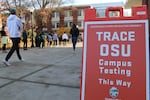Although the omicron variant of the coronavirus has thrown a wrench into early 2022 plans, most of Oregon’s colleges and universities are continuing in-person and on-campus learning for the upcoming term beginning in January.
However many campuses are considering some changes — namely requiring or encouraging COVID-19 booster shots for students and staff. One university will also delay an in-person start to the new semester in an attempt to reduce COVID-19 spread.
Oregon State University announced Tuesday it will require COVID-19 booster shots for students and employees when eligible in the upcoming term — either six months after their initial Pfizer or Moderna shots or two months after receiving the single Johnson & Johnson vaccine.
Southern Oregon University also announced a booster requirement Tuesday via an email to the campus community.
“As we have done throughout the pandemic, we will follow the science and the advice of public health officials and will require that all students, faculty, and staff remain fully vaccinated,” SOU leaders wrote in the message. “This means receiving a COVID-19 booster as soon as you are eligible.”

Students at Oregon State University line up for coronavirus testing before traveling for Thanksgiving 2020.
Sean Nealon
The University of Oregon last week also made the announcement it will require students and employees to get a COVID-19 booster. It was the first public institution to do so. The deadline for UO’s booster shot requirement is Jan. 31, or 30 days after students and employees are eligible.
The remainder of Oregon’s public universities have not announced requirements for boosters, but many have said they are strongly encouraging them. All of the public universities have required the initial doses of the COVID-19 vaccine for on-campus students and employees, or a valid vaccination exemption.
Portland Community College, the state’s largest higher education institution, continues to be mostly online and is not requiring vaccines for students or staff.
In Oregon State’s announcement Tuesday, it said Oregon’s seven public universities will all maintain in-person learning for the upcoming term, which begins Jan. 3.
“Our decision is informed by federal, state and local health authority guidance and is buoyed by positive signs that omicron, while highly transmissible, may be resulting in milder symptoms and fewer cases of severe illness, hospitalization and death,” Becky Johnson, OSU’s interim president, said in a statement. “The university’s decision is intentional. We are mindful that classrooms, where students and faculty are vaccinated and wear face coverings, have not been a significant source of virus spread. We seek to minimize disruption of student learning and experience and provide predictability for our faculty and university operations.”
Private institutions take precautions ahead of upcoming semester
Willamette University announced earlier this month that it will enforce a “quiet period” for the first two weeks of the new semester, which starts Jan. 10 for most students. In that two-week period, many classes will be moved online, and students will be encouraged to limit in-person activities.

The Oregon Capitol sits just beyond Waller Hall on the campus of Willamette University in Salem, Ore., Wednesday, Aug. 7, 2019.
Rob Manning / OPB
The private university, which officially merged with the Pacific Northwest College of Art earlier this year, said in a message to the campus community that the more-transmissible omicron variant and holiday travel both played a part in the “quiet period” decision.
“Given the risk of infection during travel, this quiet period of reduced interaction after travel gives us the opportunity to identify any cases before they have the opportunity to spread widely in our community,” the university’s COVID-19 Advisory Team wrote.
Willamette said it anticipates it will require COVID-19 booster shots for the fall 2022 semester, which begins in late August. For now, it is strongly recommending boosters for all students and employees.
Of the larger private institutions, so far Lewis & Clark College and Pacific University are the only two to announce requirements for COVID-19 boosters ahead of the upcoming semester.
“All members of the Lewis & Clark community — students, faculty, staff, and employees of our long-term, on-campus partners — are required to get a COVID booster shot as soon as they are eligible,” the Portland private college wrote on its COVID-19 response webpage.
The only exceptions are for people who have an approved vaccination exemption or are exclusively working or learning off-campus.
Pacific University made a similar announcement, requiring all eligible students and employees to provide proof of booster vaccination by Feb. 11.
“With the rise of the Delta and Omicron variants of COVID-19, continued proactive precautions are necessary,” the private Forest Grove university wrote in a campus message, “vaccination boosters significantly decrease the likelihood of infection in fully vaccinated individuals and of hospitalization in those who do become infected.”
Even private institutions that are not requiring COVID-19 vaccination, like George Fox University in Newberg, are still encouraging students and employees to get their shots.
“I’m afraid the pandemic isn’t done with us yet,” George Fox’s Vice President of Student Life, Brad Lau, wrote in a Dec. 22 message to undergraduate students.
Lau wrote that it’s clear the new omicron variant is more contagious than previous variants, though it’s still unclear whether it may bring milder symptoms.
“Either way, we know that the COVID-19 vaccine (and a booster) provides strong protection against severe illness and death,” he wrote. “As such, we strongly encourage you to get vaccinated if you are not already and, if you are, get your booster shot over the break.”
